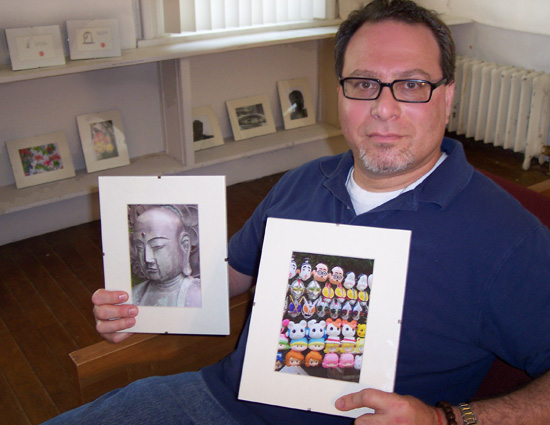Initiative Coordinator Spreads Interest in Asian Culture with Community
 |
| Stanford Forrester, coordinator of the Freeman Asian / Asian American Initiative, displays photographs and haiku in the Asian / Asian American House. |
| daylight . . . no one notices the firefly Haiku by Stanford Forrester |
| Posted 05/04/06 |
| Since he was 12, Stanford Forrester had a strong interest in Asian culture. Growing up in New York, watching Kung Fu on TV, taking karate and judo lessons, and studying Asian philosophy were his fondest pastimes.
For the last four years, Forrester has been the coordinator of the Freeman Asian / Asian American Initiative, a position that has allowed his interest in Asian culture to flourish. We bring teaching fellows directly from Japan, China or Korea and have them share their culture in Wesleyan classes, take part in Wesleyan functions and just have them here on campus to share their ideas and thoughts, Forrester says. Their presence adds to Wesleyans unique atmosphere. As the initiatives manager, Forrester manages the initiatives $1.9 million budget, plans events and maintains the Asian / Asian American Initiative Web site, http://www.wesleyan.edu/aaai. He also helps hire two or three teaching fellows each year from East Asia and provides logistical support for recruitment of visiting scholars in the field. Forrester was also responsible for developing and planning all logistics of a national conference at Wesleyan in 2005. Scholars from all over the country attended the conference to discuss Traffic and Diaspora: Political, Economical and Cultural Exchanges between Japan and Asian America. The Asian / Asian American Initiative was designed to create a bridge between the Center for the Americas and the Center for East Asian Studies, he explains. We want to offer significant opportunities for academic and cultural enrichment. The five-year, grant-funded initiative, supported by the Freeman Foundation, supports the study of Asia and the Asian Diaspora – the study of people of Asian heritage outside the geographical boundaries of Asia. The program has helped 47 undergraduates to study abroad in Asian countries, and 38 students to conduct research in the U.S. or abroad. He has used the grant money to purchase over 140 educational films, documentaries, books and other resources pertaining to Asian culture and literature to help Wesleyans students and faculty with their research. Much of Forresters initial forays into Asian culture were self-taught. He majored in Spanish at Washington and Jefferson College in Pennsylvania. He went on to receive a masters in Spanish Literature from Boston College, and has completed all the coursework needed for a Ph.D at Boston College. Forrester served as the publicity assistant and then exhibits manager at Yale University Press, and in 2002, he came to Wesleyan as the coordinator of the Asian/Asian American Initiative. I studied Spanish literature, but I was always interested in Asian culture and language, and Asian poetry, he says. So working here at Wesleyan I feel like a kid in a candy store. It combines my love for Asian culture with business administration. With Forresters love for Asian literature comes a passion for haiku, a Japanese-based, unrhymed poem linking nature with human nature. The poems, written in three lines, usually total less than 17 syllables. It can take anywhere from a few minutes to a year to write a single poem, Forrester says. Forrester, who has had over 300 poems published internationally, is a member of the Haiku Society of America. He served as the societys president in 2003 and judged the United Nations International School Childrens Haiku Contest in 2006. One of our major goals of the Haiku Society is to attract new generations of poets to teach and nurture, he says. The American culture is not poem-friendly, and there are so few venues out there that publish poetry. That is one reason Forrester opened own publishing house, Bottle Rockets Press. He designs and publishes haiku books and is editor of the national haiku journal, bottle rockets: a collection of short verse. To date, Forrester has delivered more than a dozen presentations including An Introduction to the Haiku Path at the Freeman Center for East Asian Studies and Buddhism and Haiku: Two Paths of Awareness, at Wesleyans Buddhist House. Hes also guest-taught classes with Shelia Mullen, visiting instructor in American Sign Language, and Kate Rushin, adjunct assistant professor of African American Studies and visiting writer. Integrating haiku into lessons is a great way to learn about poetry, he says. Forrester lives in Wethersfield with his wife, Mary and children Abigail, 6, and Molly, 4. |
| By Olivia Drake, The Wesleyan Connection editor |

